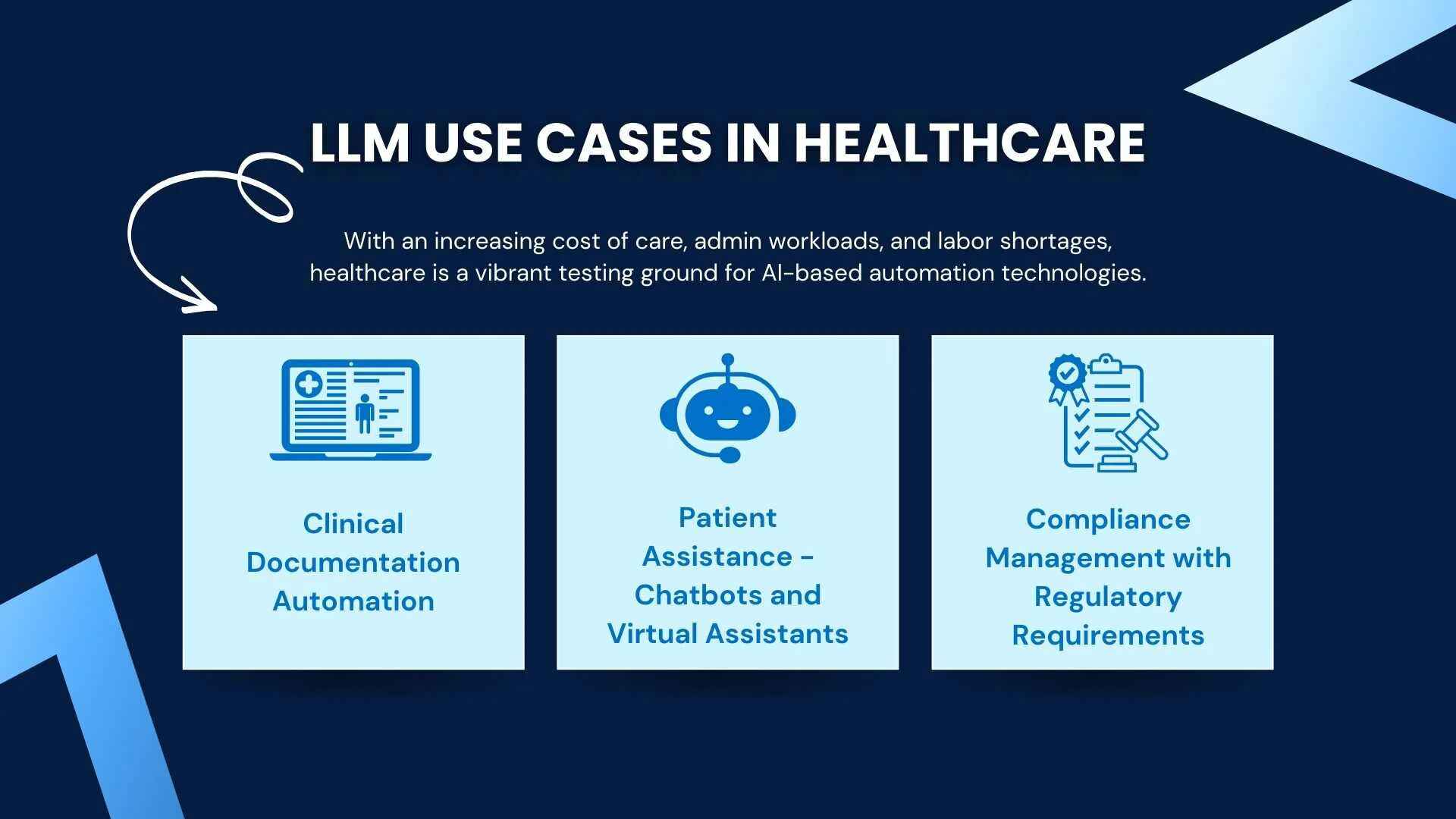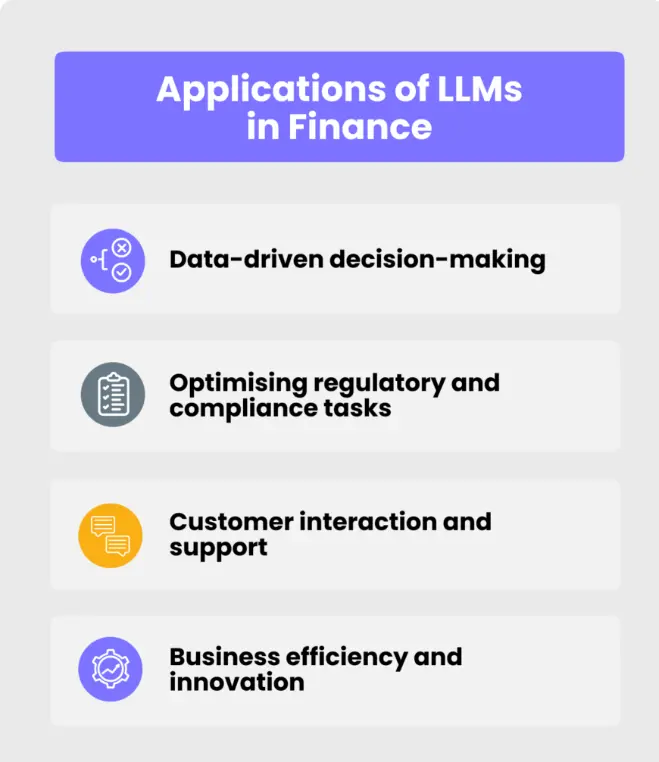Introduction
Forget expensive marketing agencies and endless brainstorming sessions. The future of content creation, customer service, and data analysis might just be hiding in your computer.
And yes, it is not sci-fi. These capabilities come from Large Language Models (LLMs). They are powerful AI systems that can write, analyze, and chat with your customers.
This guide dives into LLMs as a Service (LLMaaS), a game-changer for businesses of all sizes.
Let's see how this tech can revolutionize the way you operate.
Key Alternative LLM Applications
As businesses continue navigating the digital landscape, integrating LLM As a Service (LLMaaS) is a formidable toolset. It enhances operational efficiency and engagement.
This service model uses Large Language Models (LLMs). It offers tailored LLM alternative solutions for many business needs.
LLM as a service involves crafting diverse content. It also analyzes complex datasets. LLM as a service is becoming a key part of modern business strategies.
Let’s explore some of the key alternative LLM applications that are setting the pace for this innovative technology.
Content Creation

In the realm of content creation, LLM as a service is priceless. It generates many formats like articles, blogs, and social media posts.
These AI-driven models can produce content at a rapid pace and enhance the quality of the output. LLMs integrate SEO best practices.
It ensures that the content ranks higher in search results.
It drives more organic traffic to your site.
It churns out optimized content without effort, making LLM for businesses attractive.
It is an alternative to traditional NLP services.
For example, BuzzFeed uses LLMs to rapidly produce engaging content, incorporating SEO best practices to enhance search rankings and drive organic traffic.
Suggested Reading:The Complete Guide to LLM Development in 2024
Customer Service

Transform customer service with LLM as a service by implementing AI-powered chatbots.
The bots provide quick answers to customer inquiries. They ensure 24/7 availability without the overhead of human agents.
LLM for businesses also include sentiment analysis tools. These tools evaluate customer feedback on services and products.
This analysis helps businesses understand consumer emotions and sentiments. It lets them tailor services and address concerns better.
For example, H&M employs AI chatbots to handle customer inquiries around the clock and uses sentiment analysis to tailor responses based on customer feedback.
Suggested Reading:10 chatbots integrations to improve your customer service
Marketing and Sales
Marketing and sales have seen a revolution with the adoption of LLM as a service. By personalizing marketing messages, businesses can engage potential customers. They can do so in a more meaningful way.
LLM alternative solutions help automate lead generation and qualification. LLM alternative solutions streamline the sales funnel and improve conversion rates. This focused method enhances customer experience.
LLM alternative solutions also make marketing campaigns more efficient.
For example, HubSpot utilizes LLMs to craft personalized email campaigns and streamline lead qualification, resulting in improved conversion rates and more efficient marketing strategies.
Data Analysis and Insights
In data-driven decision-making, LLM as a service excels. It analyzes vast datasets to find trends and patterns that are not immediately obvious.
Businesses can leverage these insights to make informed strategic decisions.
LLMs can generate detailed reports and summaries. They help executives and managers understand complex data at a glance. It ensures that all managers stay well-informed.
It fosters a culture of decision-making based on knowledge.
By combining these alternative LLM applications, companies stay ahead of the curve. They also set new standards in their industries.
For example, Netflix uses LLMs to analyze viewing patterns and provide actionable insights that guide content recommendations and strategic decisions.
LLM as a Service for Different Industries
The digital transformation era is seeing a rise in LLM as a Service (LLMaaS). It is cutting across many industries. This technology is not just a tool. It is a versatile ally. It is changing how industries operate and thrive in an increasingly complex market.
From healthcare to finance, retail to education, LLM as a service is proving to be a catalyst for innovation and efficiency.
Let’s look at how LLM as a service is used in different sectors. We'll also cover the key factors to consider when choosing a provider.
Healthcare
In healthcare, LLM for businesses can digest lots of medical literature and patient data. It aids in faster, more accurate diagnosis and personalized treatment plans. Also, it boosts patient engagement.
It does this through custom health education and follow-up questions. These features ensure continuous care.

Finance
Financial institutions utilize alternative LLM applications to improve customer service and compliance monitoring. LLMs analyze customer inquiries and transactions. They do this to find fraud.
They also provide real-time, personalized financial advice. This advice greatly improves the customer experience and operational security.

Retail
LLM alternative solutions can transform the management of customers and inventory in the retail sector. LLM alternative solutions analyze purchasing patterns to forecast trends and manage stock levels efficiently.
They also power recommendation systems. These systems enhance shopping by suggesting products tailored to customer preferences.
Education
In education, LLM as a service transforms learning by providing customized tutoring and content creation. It can interpret student responses.
It uses this to tailor educational content. This makes learning more engaging and effective.
Teachers also benefit from alternative LLM applications. They automate administrative tasks, giving more time for teaching and student interaction.
Manufacturing
In manufacturing, LLMs drive innovation in product design and maintenance. They analyze design simulations and real-time machinery data. They use them to predict failures and recommend maintenance. It minimizes downtime and extends the lifespan of equipment.
Choosing the Right LLM as a Service Provider
Choosing the right LLM as a Service provider involves assessing your needs, comparing technical capabilities, ensuring security, and evaluating cost-effectiveness. Let’s discuss these factors:
Assess Your Specific Needs
Before selecting a provider, it is crucial to understand your needs clearly. Determine which aspects of your operations could benefit most from LLM As a Service.
It could be enhancing customer service, automating content creation, or getting insights from data. Knowing your goals will guide you in choosing a provider that aligns with them.
Compare Technical Capabilities
Compare LLM for businesses to traditional NLP services. Consider their processing power, language understanding, and integration. You will need a provider with advanced processing abilities.
They must also integrate well with your existing systems. This is crucial for enhancing your efficiency.
Security and Compliance
LLM for businesses handling sensitive data. So, it is vital to ensure the provider follows strict data security and privacy rules. Check if they comply with international standards like GDPR or HIPAA. This depends on your location and industry.
Scalability and Support
Consider the scalability of the LLM As a Service offering. Your chosen provider should be able to scale the services as your business grows. Also, look for a provider that offers strong support.
This includes technical help and customer service. It will ensure smooth operation and quick fixes for any issues.
Evaluate Cost-Effectiveness
Finally, weigh the cost against the expected ROI. LLM for businesses might need a big initial investment. But, the right provider should offer cost-effective alternative LLM applications.
These alternative LLM applications promise a high return on investment. They do so through increased efficiency and improved service delivery.
LLM As a Service is changing many industries. It does this by providing tailored, scalable, and efficient AI-driven alternative LLM applications.
By choosing the right LLM as a service provider, businesses can unlock this technology's full potential.It will help them stay competitive and innovative in their fields. Choose wisely to ensure that your investment in LLM technology drives your business forward.
Implementation and Integration
More and more businesses are opting for LLM As a Service (LLMaaS) to improve.
Understanding how to integrate and use this technology well is crucial. Implementing LLM as a service is more than just a technical setup.
It requires thoughtful thought. Imagine how the technology will interact with existing workflows and data.Let’s look at the steps for integration. We will also address potential challenges. Then, we will explore the future of this transformative technology.
Steps for Integrating LLM as a Service into Your Existing Workflows
The first step in integrating LLM As a Service is identifying the business processes that will benefit most from the capabilities of LLM for businesses. Once these areas are pinpointed, the integration process can begin with the following steps:
System Compatibility Check: Ensure that your current IT infrastructure can support LLM as a service. This might involve upgrading systems or adopting new APIs.
Integrate your existing data with LLM as a service. It will let you use the full power of LLM. This involves setting up data feeds that the LLM can access and process.
Workflow Mapping: Align the LLM’s outputs with your business workflows. This often requires a custom setup. It makes sure the insights from the LLM are useful to you. They will be relevant to your needs.
Suggested Reading:LLM Use-Cases: Top 10 Industries Using Large Language Models
Best Practices for Training and Optimizing the performance of LLM for businesses
To maximize the benefits of LLM for businesses, it is crucial to focus on training and optimization:
Customized Training: Train the LLM for businesses on your data. This will enhance its understanding of your business and words.
Create a continuous feedback loop: Assess the LLM's outputs often for accuracy and relevance. This allows for ongoing training and refinement.
Performance Metrics: Establish clear metrics to measure the LLM's impact on business operations. They will help in optimizing its performance over time.
Considerations and Challenges
Navigating biases and securing data in LLMs can be tricky. Let’s discuss these challenges and how to tackle them with effective strategies.
Potential Biases in LLM Outputs and How to Mitigate Them
One major concern with alternative LLM applications is the potential for biases. The biases come from the training data and can influence outputs. Mitigating these biases involves:
Diverse Data Sets: Use a varied and extensive dataset for training to ensure the LLM’s outputs are not limited by a narrow data perspective.
Bias Auditing: We will audit the LLM’s decisions for bias. It is often performed using external tools or consultants.
Ethical Guidelines: Develop a set of ethical guidelines for LLM usage. All in the organization must follow them.
Security and Privacy Concerns with LLM Data Usage
Security and privacy are critical when implementing LLM alternative solutions:
Data Encryption: Ensure all the data used by LLMs is encrypted both in transit and at rest to protect against unauthorized access.
Access Controls: Use strict access controls. Use authentication measures to restrict who can interact with the LLM and its data.
Compliance: Regularly review data protection rules. Follow them to protect your company and your customers.
The Future of LLM as a Service
The future of LLM As a Service looks promising as advancements in AI continue to evolve. We can expect LLM as a service to become easier to use and part of business operations. It will give even deeper insights and efficiencies.
Future developments might include:
Advanced Personalization: LLMs will deliver more personalized content and recommendations. They will do this by understanding the subtler nuances of user preferences and behaviors.
Greater accessibility: As technology advances and costs decrease, it will enable smaller businesses to use LLM as a service. This will democratize access to powerful AI tools.
Better Interaction Abilities: Future LLMs will likely offer more advanced interactions. They may understand and respond to human emotions and contexts better.
Conclusion
In conclusion, LLM As a Service is changing how businesses operate. Alternative LLM applications make work faster. They also boost customer engagement and find insights into data. It's done by creating great content, giving great service, personalizing marketing, and, learning from data. LLM as a service is a modern tool for businesses ready to thrive in a digital economy.
As we move into 2024, businesses can use LLM As a Service (LLMaaS) to revolutionize their operations. They can do so across many sectors.
It enhances content creation with AI tools.
It improves customer service with 24/7 chatbots.
It generates insights from vast data.
LLMaaS offers a scalable, efficient solution for specific industry needs. By using this technology, companies can stay competitive. They can also boost productivity and give personalized customer experiences. LLM technology is evolving. Its integration into daily business is helpful and a need for future success.
Frequently Asked Questions (FAQs)
What is LLM as a Service (LLMaaS)?
LLM as a service refers to the use of Large Language Models by businesses. They use them to automate tasks like content generation, customer service, and data analysis. It boosts efficiency and cuts costs.
How does LLM as a service compare to traditional NLP services?
LLMaaS offers more advanced capabilities. These include understanding context better. They also include efficiently handling large data volumes and flexible integration. It has these advantages compared to traditional NLP services.
What are some considerations when choosing an LLM as a service provider?
Key considerations include the input provider's data security. They must comply with privacy laws and have scalable LLM alternative solutions. Also, they must offer good technical support and fit specific business needs.
Are there any risks associated with implementing LLM as a service in businesses?
Risks include data privacy concerns. There's also the risk of biased AI outputs and the need for regular updates and maintenance to ensure accuracy and reliability is a risk.
How can businesses mitigate biases in LLM outputs?
Businesses can reduce biases. They can train LLMs on diverse and inclusive data sets. They can do regular bias audits. And they can set strict ethical AI use rules.
What is the future of alternative LLM applications?
LLM as a service has a promising future. Advances in AI tech will make LLM alternative solutions better. They will be more efficient and customizable. LLM alternative solutions can drive major changes and growth in business.



